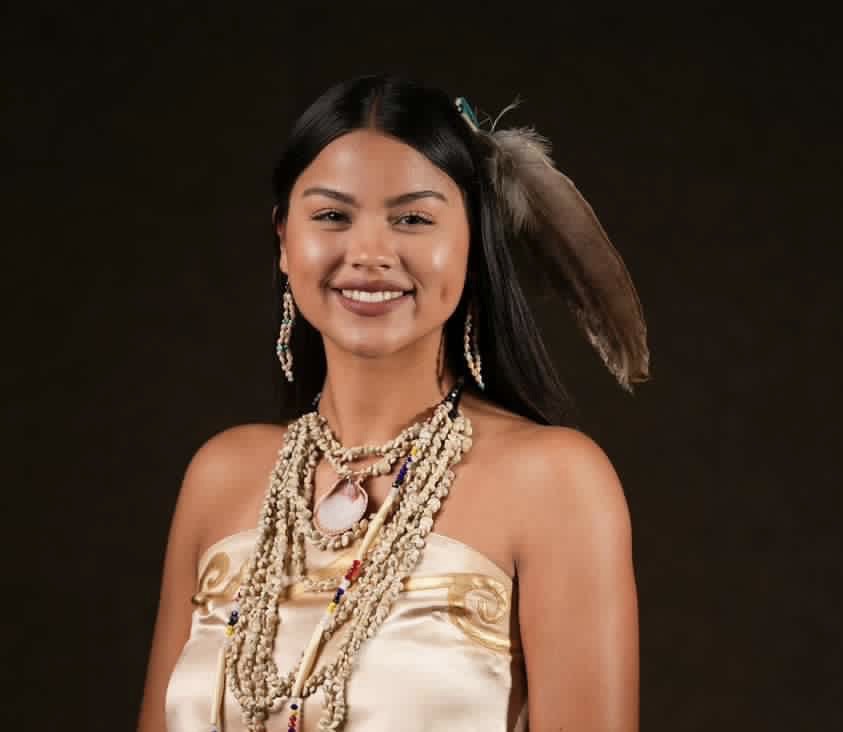
Written by 2025 Champion for Change Lourdes Pereira, a citizen of the Tohono O’odham Nation who serves as a community memory/ancestral knowledge protector for her Tribe.
Lourdes is passionate about data sovereignty and an advocate for tribes to have full control over their Intellectual Property. She is a public speaker, model and works full-time as a Program Specialist with Tribal Tech, LLC, working primarily with the Administration for Native Americans where she supports eastern region tribes and Native non-profits in maintaining their federal grants. Lourdes will be attending the University of Washington in the fall for her Master’s in Information Sciences.
My O’odham language teacher, Andrea Ramon, told me once that learning a language is like learning about an entire world view. This sentiment has stayed with me ever since and I believe it is imperative to the way we view Indigenous languages (ILs). We aren’t just talking about a “language,” we are talking about life. Many ILs are bound in relationality, meaning the majority of words cannot be separated from the person speaking them. For instance, in O’odham ñeok (language), the word “Bañ” doesn’t just mean “coyote,” it also acknowledges this animal as our little brother. “Hasañ” doesn’t just translate to “saguaro,” it acknowledges this entity as an ancestor, as a relative that protects us. Our ñeok is rooted in our traditional knowledge. To lose an Indigenous language, therefore, would be the loss of a whole world – it would be the loss of a way of being, the end of our tribal community.
My involvement as a knowledge protector (archivist) actually started with my own Indigenous language. Ñ-Sikol (my maternal great grandmother) Fillman Bell Childs was the last fluent speaker in my family, which is what originally led me to take O’odham language classes. That and knowing that, to this day, not many elders speak in the Hia-Ced O’odham dialect. During the time I was taking classes to learn O’odham ñeok, I came across Ñ-Sikol tapes that consist of her and other elders speaking in O’odham, in the Hia-Ced dialect. This experience drastically changed my life and how I viewed language preservation; archiving these tapes, which consisted of digitizing and organizing them, allowed me the opportunity of hearing them. Listening to O’odham conversations outside of class helped strengthen my pronunciation and understanding about my language. It taught me about traditional knowledge and why certain knowledge needed to be protected, but also forced me to ask critical questions like, “where would I be today without knowing O’odham ñeok?” and “why don’t many people speak this language today?”
Settler colonialism and genocide have been, and still remain, the greatest threat to ILs. Boarding schools were a place where Native children were stripped from their families and brutally forced to assimilate to settler ways of life, which meant only speaking English. While Indigenous communities are still feeling the effects of this trauma, many more threats to the preservation of Indigenous languages have arisen. There are non-Native organizations that have tried to copyright and steal IL. Certain apps that Tribes use to house their language can also list agreements that the app (not the Tribe) has ownership over the information uploaded into it. Artificial intelligence (AI) can also be harmful to IL by stealing information and producing a completely new language. In this day and age, a lot of the conversation around the preservation of Indigenous language is coming down to “ownership.” I believe we must be intentional with how we are preserving our traditional languages and do our very best to protecting it. For me, archiving actively supports my efforts in preserving my people’s language.
On this day, we should celebrate the beauty of the most resilient languages on this planet! Let’s celebrate every ancestor and relative who defied all odds and NEVER STOPPED speaking in their language. May we celebrate those who have reawakened it and make efforts every day to learn it. We should all make sure we are doing our part in preserving our languages for the next generations because the reality is: Indigenous languages have existed long before any of these modern threats and I know they will exist long after us.

